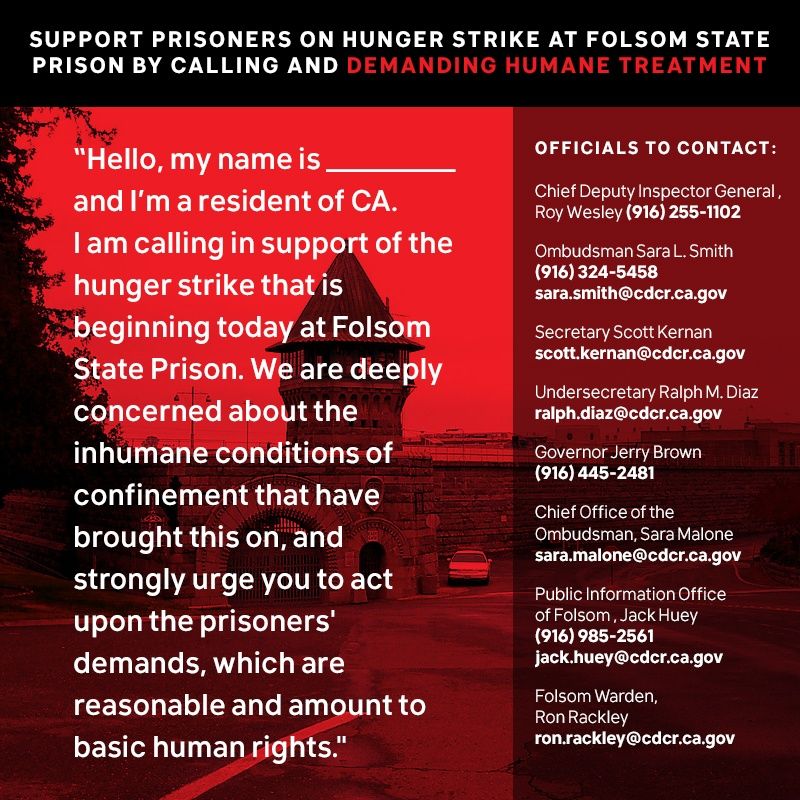“With only misery for company”: Inmates subjected to the torture practice are susceptible to brain damage, mental illness and suicide.
Inmates at California's second-oldest prison, Folsom State Prison, began a hunger strike Thursday to protest extreme disciplinary measures, abuse, and human rights violations in solitary confinement chambers where prisoners are forced to eke out their time in small dungeon-like chambers.
RELATED:
Abused and 'Forgotten,' Half of Detainees at For-Profit ICE Prison Join Hunger Strike
“Prisoners have exhausted all reasonable remedies, with no avail,” the prisoners of Folsom's B4 Administrative Segregated Units said in a statement .“Further, prisoners have attempted to open lines of communication with administrative officials and met with only resistance and silence.”
The prison, whose name is recognizable to many thanks to Johnny Cash's song, “Folsom Prison Blues,” was one of the first maximum-security prisons built in the U.S. Located 20 miles northeast of Sacramento, the prison is infamous for its overcrowded, squalid conditions and inadequate medical care facilities.
“Folsom ASU is like stepping back in time to the era when prison officials blanketed the injustice imposed on its prisoners in solitary confinement and bluntly turned a blind eye to mistreatment and the stripping away of basic human dignity and elements,” the statement continued.

Inmates are adopting the desperate hunger strike tactic, risking long-term health consequences if not their lives, in reaction to Folsom prison authorities' unwillingness to adopt the basic humane reforms recommended by the California Department of Corrections and Rehabilitation following the passage of state Proposition 57.
RELATED:
US Prison Labor Strike Inspires
The criminal justice reform proposition was approved by nearly 65 percent of California voter last year, and seeks to address the state's mass incarceration crisis by allowing inmates to be placed in lower security level facilities and create new rehabilitation and parole opportunities for inmates.
The prisoners, however, say that Folsom's authorities and majority-white staff continue to cling to unjust administrative methods and have reacted with deliberate indifference to the hardships of the inmates, who are mostly Black and brown.
“We are being deprived of basic human needs, including normal human contact, environmental and sensory stimulation, mental and physical health, entertainment, physical exercise, sleep, access to courts and meaningful activity,” the statement continued. “Prolonged exposure to these deprivations has caused and will cause serious physical and psychological harm.”
International organizations like the U.N. and human rights legal experts have long lambasted the United States' widespread and excessive use of solitary confinement as an inhumane torture method that has devastating effects on prisoners while serving no correctional or rehabilitative functions. Survivors who are deprived of basic social interaction for long periods of time are susceptible to suicide, brain damage and mental illness. Advocates have also cited data showing that the chemistry of the brain is altered after 15 days of isolation, leading to anxiety, panic, hallucinations and self-mutilation.
“CDCR is aware that the conditions of extreme isolation will likely inflict some degree of psychological trauma, these injuries include: chronic insomnia, severe concentration and memory problems, anxiety and other ailments,” the prisoners explained. “This is why all (Segregated Housing Units) and most (Administrative Segregated Units) within CDCR have provided prisoners with the opportunity to have TV’s, pull up bars, education, social and rehabilitative programs.
“However, FSP continues to put lack of money as an excuse to not fall in line with CDCR’s stated goals, and are content to ignore the suffering of men in its care,” the statement adds. “We continue to be confined alone in our cells with only misery for company.”
In 2013, 30,000 California inmates held a 60-day hunger strike, refusing meals and risking death to demand similar reforms from the CDCR as those cited by Folsom's prisoners. The hunger strike began in Pelican Bay State Prison's windowless Security Housing Units – or solitary confinement boxes – and rippled across the California prison system. The collective action was the largest prisoner hunger strike in the state's history and managed to unite prisoners from different ethnicities and different gangs such as the Aryan Brotherhood, Black Guerrilla Family, Mexican Mafia and Nuestra Familia.
RELATED:
US Attorney General Sessions Declares War on Poor, Black and Brown Communities
A 2014 study by the Atlantic Journal of Communication detailed how confinement and sensory deprivation are among the worst facets of a U.S. criminal justice system that has a devastating impact on racialized communities already confronted by poverty, homelessness and joblessness, having a ripple effect on depression, drug addiction and mental illness within these communities. The study also found that recidivism rates for solitary confinement survivors is higher than the rate for those who are spared the inhumane treatment. Despite such findings, the practice remains a popular tool for administering punishment against inmates, regardless of the security risk posed by individual inmates.
Since taking office, U.S. President Donald Trump has been vocal about a “tough-on-crime” approach while Attorney General Jeff Sessions has likewise promised to boost incarceration rates and crack down on both violent criminal offenders and nonviolent drug offenders alike, reviving draconian mandatory minimum sentences that have ensured the United States' front-runner status as the largest jailer in the world.
The statement concludes with a plea for supporters to help make the inmates' voices heard by calling state officials to inform them about the dire human rights crisis at Folsom State Prison.
